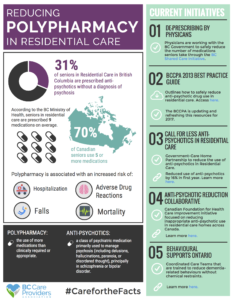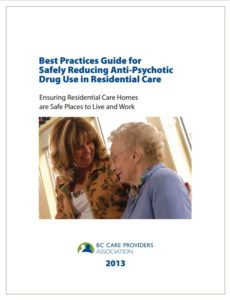As part of its continued efforts to support quality improvement in the continuing care sector, the BCCPA intends to release a 2017 update of its Antipsychotics Best Practice Guide. The updated antipsychotics best practice guide will include a literature review, an overview of best and emerging practices from across Canada and internationally, as well as highlighting the efforts of BCCPA members to ensure the appropriate use antipsychotics in their residential care homes.
2017 Renewal of BCCPA Antipsychotics Best Practice Guide – how you can help
 BCCPA members are encouraged to submit a profile of your organization outlining what initiatives or programs you are currently undertaking or have undertaken in the past three years to reduce the use of antipsychotics among your clients or residents. The BCCPA asks that members use the reporting template (right-click, save Word doc) to outline the key details such as an overview of the initiative(s), measurable outcomes, and the contact information for your organization.
BCCPA members are encouraged to submit a profile of your organization outlining what initiatives or programs you are currently undertaking or have undertaken in the past three years to reduce the use of antipsychotics among your clients or residents. The BCCPA asks that members use the reporting template (right-click, save Word doc) to outline the key details such as an overview of the initiative(s), measurable outcomes, and the contact information for your organization.
Completed member profiles can be sent directly to Lara Croll, Policy Analyst, at lara@bccare.ca by the June 30, 2017 deadline. Members that submit a profile for their organization will be eligible to win one of two prizes:
- One free registration to the BC Care Provider’s 41st Annual Conference in Whistler; or
- One free registration for our 2018 season of Care to Chat.
Download Reporting Template (Word format) for Member Profile: click here.
Background: Antipsychotics in Seniors Care

Anti-psychotic medications are drugs that are commonly prescribed to seniors in both community and residential care settings, to manage the behavioral and psychological symptoms of dementia (i.e. responsive behaviors and aggression).
However, it is well documented that antipsychotics may provide limited benefit and can cause serious harm, including an increased risk for falls and even premature death. The Canadian Geriatric Society, for example, has declared that the use of these drugs should be limited to cases where non-pharmacological measures have failed and patients pose an imminent threat to themselves or others. Most recently Choosing Wisely Canada has also recommended that antipsychotics not be the first choice to treat behavioral and psychological symptoms of dementia.
Despite known health risks of antipsychotics, 39 per cent of residents in long-term care in Canada were prescribed an antipsychotic at least once in 2014, according to a report by the Canadian Institute for Health Information (CIHI). Furthermore, recent figures from the Canadian Foundation for Healthcare Improvement (CFHI) shows that 31.2 percent of long-term care residents in BC are inappropriately prescribed antipsychotics medication, which is slightly higher than Canadian average (27.5%).
While these rates are high, there has been some progress in reducing use of antipsychotics. In late November 2016, for example, CIHI reported that the potentially inappropriate use of antipsychotics in long term care in Canada decreased from 32.5% in 2011–12 to 23.9% in 2015–16. The BC Office of the Seniors Advocate report (November 2016) also showed a decrease of 14.2% in the potentially inappropriate use of anti-psychotic drugs in residential care between 2013/14 and 2015/16 for BC.
2013 Best Practices Guide for Safely Reducing Anti-Psychotic Drug Use in Residential Care
In order to support our members in their efforts to ensure the appropriate use of anti-psychotic medications in their organizations, the BC Care Providers Association (BCCPA) developed its first Best Practices Guide for Safely Reducing Anti-Psychotic Drug Use in Residential Care in 2013. This guide was designed to help long term care providers reduce the use of anti-psychotic drugs in their residential care homes.
In particular, the 2013 Guide highlighted successful anti-psychotic drug reduction strategies implemented by seven BC residential care providers. Since its initial release in 2013, the guide has been one of the most popular downloaded documents on the BCCPA website. Some of the results and best practices highlighted included:
- 50% reduction in the use of antipsychotics (Luther Court Society, Victoria);
- Only 22% of residents prescribed an atypical anti-psychotic (Lodge at Broadmead, Saanich);
- Only 21% of residents are on atypical antipsychotics (Northcrest Care Centre, Delta);
- 45% reduction in anti-psychotic use within four months (New Vista Society, Burnaby);
- Reduced the use of antipsychotics from 25% to 3.5% (Cheam Village, Agassiz);
- Fewer than 30% of residents are on antipsychotics (Creekside Landing, Vernon); and
- 51% reduction in anti-psychotic medication use (The Hamlets at Westsyde, Kamloops).






